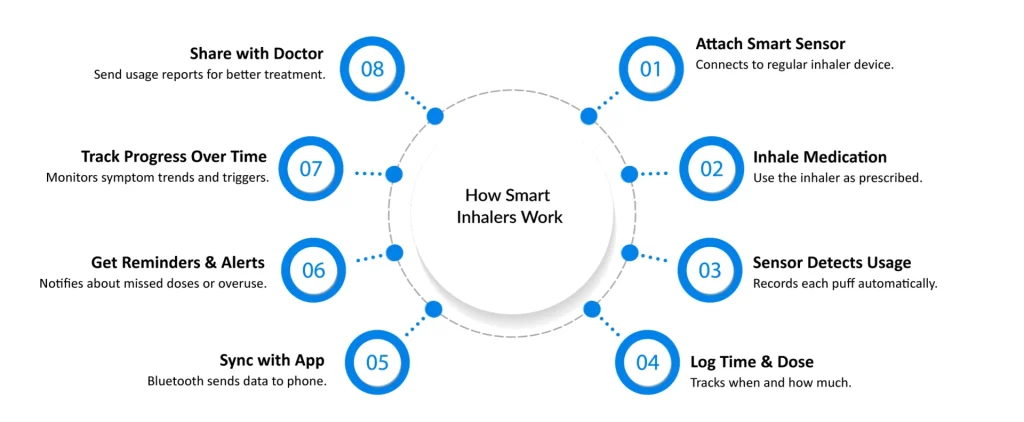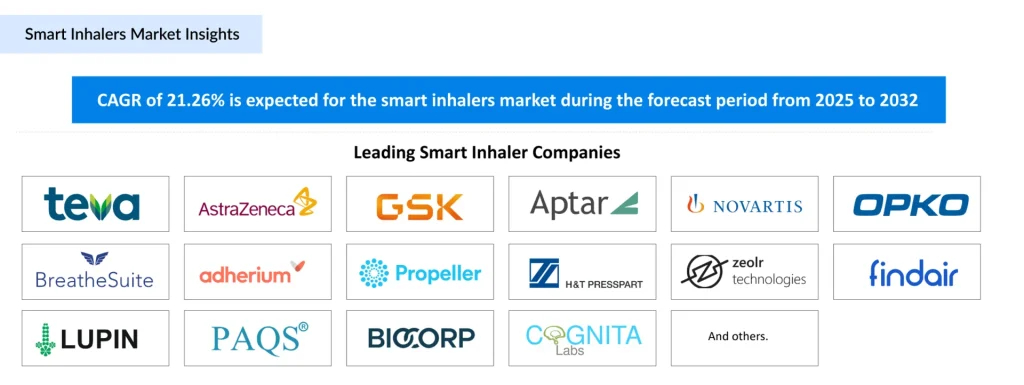Smart Inhalers: Redefining Respiratory Care with Technology and Data
Sep 24, 2025
Table of Contents
The smart inhalers market has been rapidly evolving as digital health and connected medical devices gain traction worldwide. With increasing adoption of telemedicine, remote monitoring, and personalized healthcare, smart inhalers are emerging as a transformative solution for both patients and healthcare providers. Pharmaceutical companies, medtech innovators, and digital health startups are actively investing in this space, making smart inhalers one of the most promising segments in respiratory medicine.
Smart inhalers are primarily used in managing asthma and chronic obstructive pulmonary disease (COPD), two of the most prevalent respiratory conditions globally. According to the World Health Organization (WHO), asthma affects over 262 million people and caused nearly 455K deaths in 2019, while COPD is the third leading cause of death worldwide, responsible for 3.23 million deaths in the same year. These staggering figures underscore the urgent need for more effective disease management solutions that enhance adherence, reduce exacerbations, and improve quality of life.
Downloads
Click Here To Get the Article in PDF
Recent Articles
- IntraBio’s AQNEURSA Niemann-Pick Disease Approval; FDA Approves Novel Schizophrenia Drug After 35...
- Phase 1 data of CYC065; Lysogene delays phase 3 study; Genetic disorders Diagnosis; PD-1 resistan...
- Global Hemophilia Market
- Vagus Nerve Stimulators Market Outlook
- Telehealth: Opportunities and Hurdles in Virtual Healthcare Market

Why are Smart Inhalers Gaining Importance in Respiratory Medicine?
Respiratory diseases such as asthma and chronic obstructive pulmonary disease remain a growing global health concern, affecting millions of people worldwide. One of the biggest challenges in managing these conditions is poor medication adherence, patients often forget or misuse inhalers, leading to uncontrolled symptoms and frequent hospital visits. Smart inhalers directly address this problem by promoting adherence, improving self-management, and enabling early intervention through continuous monitoring.
Additionally, with the rise of telehealth and digital healthcare ecosystems, smart inhalers are becoming valuable tools for remote patient management. Physicians can track inhaler usage patterns, detect triggers of exacerbations, and tailor treatment strategies accordingly. This integration of technology with traditional therapy is why smart inhalers are increasingly seen as the future of respiratory medicine.
How Smart Inhalers Work
One of the most common questions patients and healthcare professionals ask is: How do smart inhalers work? Unlike traditional inhalers, smart inhalers are equipped with digital sensors that track device usage in real time. These sensors detect when a patient takes a dose, measure inhalation technique, and record the exact time of use. This data is then transmitted securely to connected devices through Bluetooth-enabled smart inhalers, ensuring accurate monitoring without disrupting daily routines.
The core of smart therapy inhalers lies in their seamless integration with smartphones and digital health platforms. Through dedicated apps, patients receive reminders, adherence feedback, and personalized coaching to optimize their treatment. Clinicians, on the other hand, gain access to detailed dashboards that help them assess medication patterns, adjust prescriptions, and predict potential exacerbations before they become critical.
Another powerful advantage of smart inhaler therapy is its compatibility with remote monitoring systems. In an era where telemedicine is reshaping patient care, these devices allow healthcare teams to track adherence and disease progression from a distance. This not only reduces the risk of hospitalizations but also empowers patients to take control of their respiratory health.
In essence, smart inhalers combine drug delivery with cutting-edge digital health technology, transforming routine treatment into a data-driven, personalized care experience.
Key Benefits for Patients and Healthcare Providers
The adoption of smart inhalers brings measurable advantages to both patients and healthcare systems. One of the most impactful benefits is improved medication adherence, as these devices record real-time usage data and send reminders to patients when a dose is missed. For chronic conditions like asthma and COPD, where non-adherence is a leading cause of hospital visits, this digital support can significantly reduce flare-ups and improve long-term disease control.
Another critical advantage is the early detection of worsening conditions. By analyzing inhaler usage patterns and symptom trends, clinicians can spot warning signs such as increased rescue inhaler use. This proactive insight allows for timely intervention, reducing the risk of severe exacerbations and emergency hospitalizations.
For healthcare providers, smart inhalers provide a new level of visibility, enabling better clinical decision-making. Access to objective, continuous data enables physicians to tailor therapies more precisely, optimize treatment plans, and even identify patients who may benefit from alternative or advanced therapies. In turn, this supports value-based care models by improving outcomes while lowering healthcare costs.
By bridging the gap between patients and providers, smart inhalers transform respiratory care into a more personalized, preventive, and efficient approach.
Smart Inhalers Market Outlook
The smart inhalers market is undergoing rapid expansion, with strong adoption expected over the next decade. According to DelveInsight, the market is projected to grow at a CAGR of 21.26% between 2025 and 2032, reflecting rising demand for connected respiratory care solutions across major markets.
A key driver of this growth is the increasing prevalence of chronic respiratory conditions such as asthma and COPD. In 2024, there were about 31 million diagnosed prevalent cases of COPD in the 7MM, with the U.S. reporting the highest burden, primarily linked to cigarette smoking. Similarly, asthma affected nearly 57 million patients across the 7MM, with the U.S. accounting for around 26 million cases, the EU4 and the UK contributing 25 million, and Japan representing nearly 6 million. The growing patient pool underscores the urgent need for effective disease management strategies, making smart inhalers a compelling solution.

Beyond epidemiology, the broader adoption of digital health technologies is also fueling market momentum. With sensors, Bluetooth connectivity, and integration into telemedicine platforms, smart inhalers align perfectly with the global shift toward remote monitoring and personalized care. These devices not only improve adherence but also generate actionable data for clinicians and payers.
Despite the promising outlook, challenges remain. High costs of connected devices, data privacy concerns, and unequal accessibility across regions could limit adoption, especially in lower-income populations. However, as awareness grows, regulatory frameworks evolve, and competition among device manufacturers intensifies, these barriers are expected to ease, paving the way for wider uptake of smart inhaler therapy.
Leading Smart Inhalers Companies
The smart inhalers market is supported by a diverse mix of global pharmaceutical giants, innovative device manufacturers, and emerging digital health startups. Key players driving innovation and market growth include Teva Pharmaceutical, AstraZeneca, GlaxoSmithKline plc, AptarGroup, Novartis AG, OPKO Health, BreatheSuite, Adherium, Propeller Health, H&T Presspart Manufacturing Ltd, Zeolr Technologies Pvt Ltd, Findair Sp. z o. o, Lupin, Personal Air Quality Systems Pvt Ltd (PAQS), Biocorp, Cognita Labs, and several others.
These companies are actively developing Bluetooth-enabled smart inhalers and smart therapy inhalers that are integrated with advanced sensors and mobile apps, enabling smart inhaler therapy. This technology improves patient adherence, tracks usage in real-time, and supports remote monitoring by healthcare providers. Many are also exploring collaborations and licensing deals to expand product portfolios and accelerate market penetration globally.
Smart Inhalers Recent Developments and Innovations
The smart inhaler market is advancing rapidly, driven by AI-powered monitoring, connected devices, and enhanced patient adherence tools. Collaborations between pharma and digital health companies are driving innovative solutions to optimize respiratory care.
FDA and EMA Approvals and Launches
The regulatory landscape for smart inhalers has seen significant advancements in recent years. Notably:
- FDA Approvals for Smart Inhalers: In August 2025, the FDA highlighted the approval of several generic metered-dose inhalers (MDIs) that utilize green propellants, aiming to reduce global warming potential. These advancements are part of the FDA’s ongoing efforts to enhance the environmental sustainability of inhaler devices.
- EMA’s Regulatory Activities: The European Medicines Agency (EMA) continues to evaluate and approve various inhaler therapies. Notably, in November 2024, the EMA published the COMP-AIR protocol, which assesses the comparative clinical effectiveness of combination inhalers like Fostair® and Symbicort®. These evaluations are crucial for determining the most effective treatment regimens for asthma patients.
Strategic Partnerships Between Pharma and Digital Health Companies
Strategic collaborations are accelerating the integration of digital health technologies into respiratory care:
- Adherium and AstraZeneca Collaboration: In April 2024, Adherium partnered with AstraZeneca to integrate its Hailie® Smartinhaler® technology with AstraZeneca’s inhaler products. This collaboration aims to provide real-time medication adherence data, enhancing patient management and treatment outcomes.
- Propeller Health’s Collaborations: Propeller Health continues to collaborate with various pharmaceutical companies to incorporate its sensor technology into inhalers. These partnerships focus on improving medication adherence and providing healthcare providers with valuable insights into patient usage patterns.
Emergence of AI-Powered Inhaler Devices
Artificial intelligence is playing a pivotal role in the evolution of smart inhalers:
- Oklahoma State University’s AI-Powered Inhaler: In April 2024, researchers at Oklahoma State University introduced an AI-powered inhaler designed to assist in the treatment of lung diseases. This device utilizes machine learning algorithms to analyze inhalation patterns, aiming to predict and prevent potential exacerbations in patients with chronic respiratory conditions.
- AI-Integrated Dry Powder Inhalers (DPIs): Recent studies have validated the use of AI-integrated dry powder inhalers for measuring inhalation parameters. These devices are designed to improve therapy adherence and inhalation techniques in patients with asthma and COPD, offering personalized treatment adjustments based on real-time data.
Future of Smart Inhalers
The future of smart inhalers is poised to transform respiratory care by integrating personalized medicine, predictive analytics, and telehealth solutions. With the ability to track individual medication usage and monitor respiratory patterns in real time, smart inhaler therapy enables clinicians to tailor treatment plans to each patient’s unique needs. This level of personalization has the potential to reduce exacerbations, improve medication adherence, and optimize clinical outcomes for patients with asthma, COPD, and other respiratory conditions.
Advancements in Bluetooth-enabled smart inhalers are expanding the possibilities of remote monitoring. These devices can automatically sync with mobile apps and telehealth platforms, providing healthcare providers with actionable insights into patient behavior and lung function. By understanding how do smart inhalers work, patients and clinicians alike can make informed decisions about therapy adjustments, ensuring optimal disease management.
Emerging smart therapy inhalers are increasingly incorporating artificial intelligence (AI) to predict flare-ups before they occur. Predictive analytics combined with real-time monitoring can alert patients and providers about early signs of deterioration, enabling timely intervention. This proactive approach marks a significant shift from traditional reactive care to a more anticipatory model, ultimately enhancing quality of life and reducing healthcare costs.
Conclusion
Smart inhalers represent a crucial step toward proactive and personalized respiratory care. By combining data-driven insights, connectivity, and advanced technology, these devices are redefining smart inhaler therapy and empowering both patients and healthcare providers to achieve better clinical outcomes and a higher standard of care.

Downloads
Article in PDF
Recent Articles
- Advances in NASH Therapeutics Space: Latest Breakthroughs in Drug Development
- FDA Grants Approval to Merit Medical’s WRAPSODY Endoprosthesis; FDA Clears AVITA Medical’s ...
- Business Cocktail
- Cardio Flow’s FreedomFlow Orbital Atherectomy Peripheral Platform; Medtronic’s Aurora EV- ICD Sys...
- Breakthrough Device Designation granted to the AI Software for CTEPH



